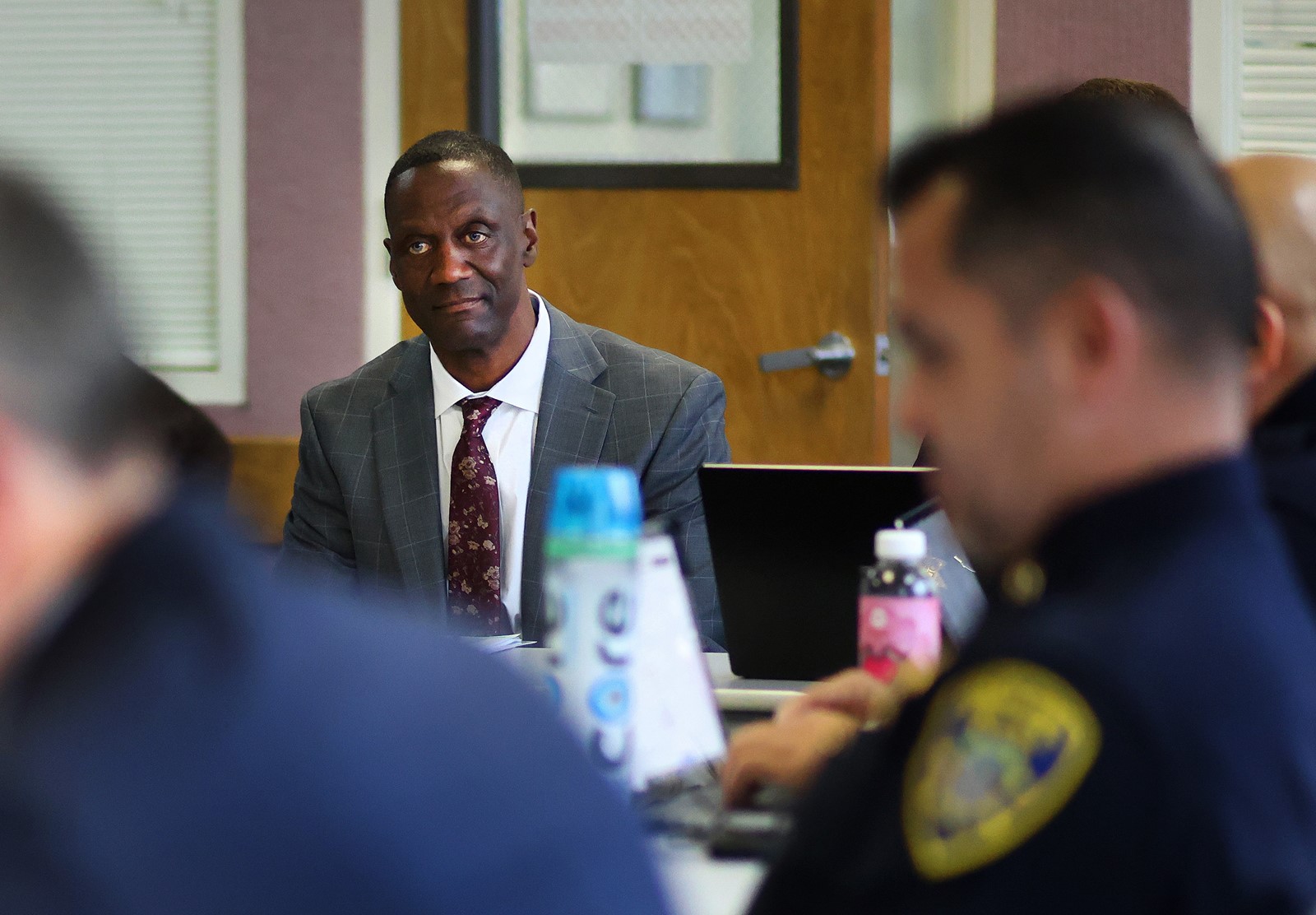OAKLAND — Two years ago, California officials were ready to crack down on Oakland’s frustratingly slow 911 response times, even threatening to pull state funding if the city did not crank up its speeds.
Those calls are now being answered at a dramatically faster rate, officials at the state Office of Emergency Services said last week.
Data provided by the state office indicate that Oakland is now picking up 911 calls at double its old speed, with nearly 72% of calls answered in under 15 seconds. In July 2023, the city was meeting that threshold just 38% of the time.
The improvements mean the state “does not intend to withdraw any funding” from the Oakland Police Department, Anita Gore, an official at the emergency services office, said in an email.
What makes the improvement especially remarkable is that the city has not significantly increased its dispatcher staffing from a couple years ago. Oakland has 13 vacancies among the equivalent of 78 full-time positions — one fewer vacancy than in mid-2023.
It is a notch in the belt for Oakland Police Chief Floyd Mitchell, who said the 911 dispatch problems at his last career stop, in Lubbock, Texas, were the result of inadequate direct communication with dispatch staff.
On the other hand, police continue to struggle with timely arrival at crime scenes. The time it took officers to arrive an emergency jumped dramatically between 2022 and 2023, ticking down only slightly last year, according to a city report.
It was taking Oakland police roughly 43 minutes on average over the first six months of last year to respond to calls known as “priority one,” including shootings or sexual assaults or when someone is in immediate danger of death. That was up from the same six-month period in 2023, when the average was 27 minutes — itself an increase from the year before, when it was 18 minutes.
It took nearly 6 hours, 47 minutes on average for officers to respond to “priority two” calls, which involve an immediate threat of property damage, in the first six months of last year. That was nearly 90 minutes longer than over the same period in 2023.
Still, the city’s dispatchers are answering calls faster — and the threat of losing state funding is at bay, for now. Officials named personnel as the biggest factor in the department’s improved response times, though they also credited the city’s non-emergency response services, as well as an automated attendant, for freeing up humans to handle calls for dangerous situations.
Indeed, automation is taking off; police departments in Fort Worth, Texas, and Salt Lake City have begun experimenting with artificial intelligence to assist with handling 911 calls. Oakland officials did not indicate whether it intends to also incorporate AI for emergency dispatch.
Meanwhile, the city’s Mobile Assistance Community Response Organization has picked up a lot more slack on the dispatch end after earlier being criticized by police union leaders for easing too little of the 911 burden. The program, designed to provide unarmed aid to those suffering mental-health crises, diverted 34% of emergency calls last year, a staggering increase. The number was 3% in early 2023.
Elliott Jones, who heads the MACRO program under the Oakland Fire Department’s umbrella, credited his team’s own staffing levels.
“MACRO is human-powered,” he said in an interview last month. “We’ve doubled our staff and then some.”
Police dispatch staff, meanwhile, fluctuated throughout the tenure of Chief LeRonne Armstrong, who was fired — over a controversy unrelated to 911 response — several months before the city first heard from state emergency officials about OPD’s slow response times.
At the time, the state warned that Oakland needed to meet the 15-seconds-or-fewer threshold for 90% of its 911 calls, an industry standard set by the National Emergency Number Association. Otherwise, the state would yank funding and redirect the city’s 911 response to a third-party center.
“One of the challenges was that it is a long, arduous training process,” Armstrong said Thursday in an interview, noting it would take a newly hired dispatcher “a year and a half to actually be on the floor and to be able to independently dispatch 911 calls.”
Mitchell, the city’s current chief, ironically left his last job after news media in Lubbock reported that 911 response times by the city’s police department had plummeted during his tenure. Upon arriving in Oakland, he promised a “boots on the ground” approach to the issues faced by a much larger police force.
If Oakland’s improved rate of answered calls comes as a surprise, then so might the fact that staffing levels are holding relatively steady — given that Oakland has struggled in the past two years with crippling financial problems after its federal COVID-19 relief money dried up.
Police officer staffing has diminished since the pandemic, with 652 sworn on the force as of Friday, and somewhere about 90 of them on either administrative or medical leave.
Another reason Oakland struggled in the first place may simply have been that Oakland 911 operators deal with much more intense calls on a regular basis than their counterparts in police departments that see lower crime levels.
“In no other city do you have to deal with dispatching police officers to a shooting of other law enforcement officers,” Sgt. Huy Nguyen, the head of the city’s police officers union, said in an interview. “That takes a toll on you as a person, on your family. People don’t really look at their mental well-being and the problems they face.”
It is a hard job where training can change everything — including the speed of response times, said Regina Harris, a retired former head of the city’s police dispatch center. Still, she said, “I enjoyed every minute of it.”
“It was definitely stressful at times,” Harris said, “however, it was very rewarding knowing that we were providing a valuable service to the community.”



 PREVIOUS ARTICLE
PREVIOUS ARTICLE
